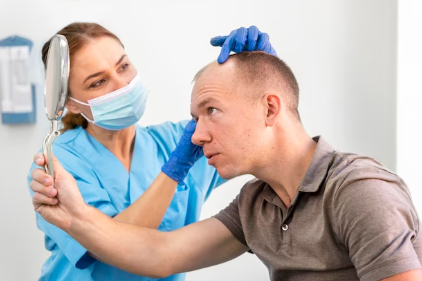Maintaining a healthy diet is crucial for preventing hair loss and promoting overall hair health. Here are eight diet tips that can help prevent hair loss:
Eat Protein-Rich Foods: Hair is primarily composed of protein, so ensure you consume an adequate amount of protein from sources like lean meats, poultry, fish, eggs, dairy products, legumes, nuts, and seeds.
Incorporate Iron-Rich Foods: Iron is essential for proper hair growth and preventing hair loss. Include iron-rich foods like red meat, spinach, lentils, tofu, and fortified cereals in your diet.
Consume Foods High in Biotin: Biotin is a B-vitamin that supports hair health. Foods like eggs, nuts, whole grains, and cauliflower are good sources of biotin.
Get Enough Vitamin C: Vitamin C is an antioxidant that aids in the absorption of iron and supports collagen production, important for hair structure. Include citrus fruits, strawberries, kiwi, and bell peppers in your diet.
Include Omega-3 Fatty Acids: Omega-3 fatty acids nourish the hair and support scalp health. Incorporate fatty fish (like salmon and mackerel), flaxseeds, chia seeds, and walnuts into your meals.
Consume Zinc-Rich Foods: Zinc plays a role in hair tissue growth and repair. Zinc-rich foods include oysters, beef, pumpkin seeds, and lentils.
Add Vitamin A-Rich Foods: Vitamin A helps produce sebum, a natural conditioner for the scalp. Include sweet potatoes, carrots, spinach, and kale in your diet.
Stay Hydrated: Drink plenty of water to keep your body and scalp hydrated, supporting overall hair health.
Additionally, maintain a balanced diet with a variety of nutrient-dense foods to ensure you receive all the essential vitamins and minerals necessary for healthy hair growth. Avoid crash diets or extreme restrictions, as they can lead to nutrient deficiencies and impact hair health.
Remember that while a healthy diet is vital for hair health, other factors like genetics, hormonal imbalances, stress, and underlying medical conditions can also contribute to hair loss. If you’re experiencing significant hair loss or have concerns about your hair health, it’s best to consult with a dermatologist or healthcare professional to identify the root cause and receive appropriate advice and treatment.



